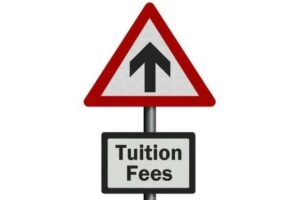According to the US Department of Education, college tuition and fees are increasing by an average of 5% a year over the past decade. With inflation at a steady 3% per year, that suggests that real college costs are increasing by about 2% per annum. So whether you are going to a local community college or a pricey private four year institution, expect to pay more that your older brother had to.
So shouldn’t there be increasing expectations on the product these schools are offering as well? In any other industry in a capitalist system the price goes up when either the demand for the product increases or the quality of the product increases. While indeed there are more students trying to get into college today than twenty years ago, there are also many more institutions, and with online courses and entire university higher education programs available over the internet, it’s not as if there is insufficient supply to meet the demand. So where’s the beef?
Despite having the most expensive education system in the world, the U.S. is ninth among industrialized nations in terms of sending high school graduates on to college. Is this simply an indictment of our weak public high school system, or are students simply unable to pay the rising costs of college. I don’t want to get into a political debate on social vs. private education systems and government policy, but it does seem that there are two factors at play here. Sure, there is the unfortunate 30% high school drop out rate in the United States, which is both appalling and embarrassing. But what about the 70% that do graduate high school. Why are they still unable or unwilling to go to college?
Many may suggest it is the social norms or simply the specific characters of different nations that determines why certain countries have high college attendance rates. I am quite certain, however, that the continued rising costs of college education in this country is playing a significant role in keeping students out in the cold when it comes to university higher education. In developed countries where the government subsidizes college, the post-secondary enrollment rate of high school graduates is up to 20% higher than in the United States.
Sure the US government offers loans, but many students do not wish to be saddled with $60 to $120K in debt upon receiving a degree. It could take one 20 years to pay off such a “gift.” The question is simply is the value proposition of a college diploma worth the tuition price in our current university higher education offerings. Considering the number of Americans in debt and the overall collapsing of our borrower heavy economy, I would have to say no.

